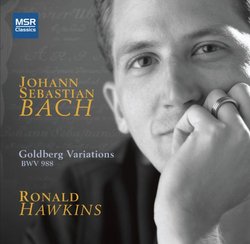| All Artists: Ronald Hawkins Title: Johann Sebastian Bach: Goldberg Variations, BWV.988 Members Wishing: 1 Total Copies: 0 Label: MSR Classics Original Release Date: 1/1/2009 Re-Release Date: 2/3/2009 Genres: New Age, Classical Styles: Instrumental, Chamber Music, Historical Periods, Classical (c.1770-1830) Number of Discs: 1 SwapaCD Credits: 1 UPC: 681585132425 |
Search - Ronald Hawkins :: Johann Sebastian Bach: Goldberg Variations, BWV.988
 | Ronald Hawkins Johann Sebastian Bach: Goldberg Variations, BWV.988 Genres: New Age, Classical
More than two hundred and sixty-five years ago, in 1741, nine years prior to his death, the fifty-six year old Royal Polish and Electoral Saxon Composer, Kapellmeister and Director Chori Musici in Leipzig, JOHANN SEBASTIA... more » |
Larger Image |
CD Details
Synopsis
Product Description
More than two hundred and sixty-five years ago, in 1741, nine years prior to his death, the fifty-six year old Royal Polish and Electoral Saxon Composer, Kapellmeister and Director Chori Musici in Leipzig, JOHANN SEBASTIAN BACH, published his fourth and final series of Clavier Ubung (Keyboard Practice). Bach was very clear with his intentions in writing this monumental piece; he inscribed on the title age, Prepared for the Souls Delight of Music Lovers. There is great debate over the title, Goldberg Variations, as there is no dedicatory inscription on the score, which is customary with a commissioned work. However, the debate over the title is academic and has no musical implications on the work. The title has been around as early as 1802 and will surely remain for years to come. Johann Nikolaus Forkel, the first biographer of J.S. Bach, in his book Johann Sebastian Bach: His Life, Art, and Work, recalls a story told about the Goldberg Variations: [W]e owe them to Count Kaiserling, formerly Russian Ambassador at the Saxon Electoral Court, who frequently visited Leipzig, with Goldberg. Johann Gottleib Goldberg was a young harpsichordist who was employed by Count Kaiserling. During their visits to Leipzig, Goldberg would study with Bach. Count Kaiserling suffered from neuralgia, a painful disorder of the cranial nerves, and subsequently he experienced insomnia. It was during these times when the Count would have Goldberg play for him to pass the night. Forkel continued, [O]ne day the Count asked Bach to write for Goldberg some Clavier music of a soothing and cheerful character, that would relieve the tedium of sleepless nights. For long afterwards, when he could not sleep, [the Count] would say, Play me one of my Variations, Goldberg. Thus the name was created. The Goldberg Variations, a masterpiece of truly unique musical attributes, is comprised of an Aria and thirty diverse variations. Unlike traditional variations, where the composer bases the variations on a melodic theme, Bach composed a beautiful Sarabande (Aria) and bases the variations on the harmonic progression of the left hand. The variations are masterfully crafted. There are nine canons, placed every third variation, except in No. 30, where Bach composed a Quodlibet (what you please). There, Bach wrote two German folk songs, I Have So Long Been Away From You, (an innocent love song), and Cabbage and Beets Have Driven Me Away, Had Mother Cooked Beef, I Would Have Chosen To Stay, (a Good-bye Song), which was often sung at the conclusion of a dance party. Hailed for his great depth of poetry, understanding and excitement (Gazette), American pianist Ronald Hawkins is quickly establishing himself as one of the country s leading pianists and has earned international acclaim for his sensitive and insightful performances. Subsequent to his international debut in 1997 at The Rachmaninoff Conference held in England, he has performed in venues throughout North America and Europe, with appearances that include Carnegie Hall, The Lyceum, Tchaikovsky Great Hall and St. Martin-in-the-Fields. In September 2007, Mr. Hawkins received the prestigious 2007 Young Career Award for his achievements in music. Other awards and honors include the Richard Ford Foundation Deeper Piano Studies Grant, Hartt School Faculty Development Grant, Rose Hanus Full Scholarship, Sullivan Grant, Who s Who Among American Universities and Colleges, Marion Park Lewis Foundation for the Arts Endowment, Cecil Hefner Scholarship, Shenandoah Conservatory Keyboard Scholarship, Greer Young Artist Scholarship, Greer Music Club Scholarship and honors in piano and composition at Brevard Summer Music Camp. In February 2002, Web Concert Hall named him Artist of the Month.

 Track Listings (32) - Disc #1
Track Listings (32) - Disc #1